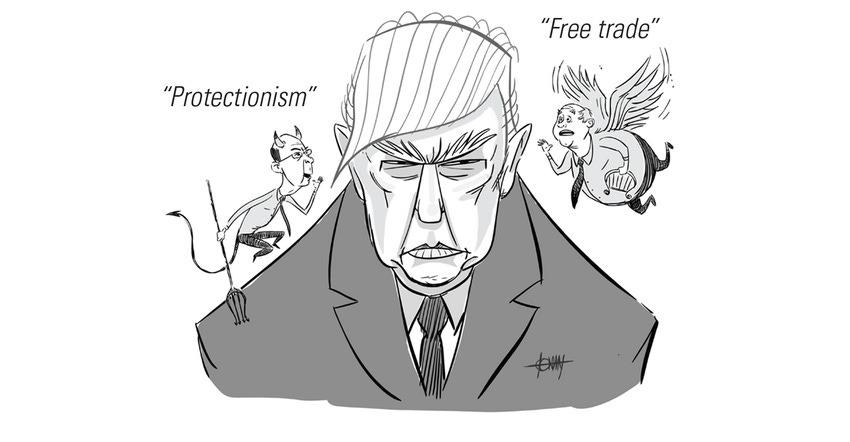
Farmers at the Commodity Classic last month expressed just about every emotion possible when it came to the man who resides in the White House. It’s safe to say these last few weeks have caused a few of them to wonder if he’s still on their side.
You’ve seen the headlines: Hope turn to dismay as White House announces tariffs; Will soybean exports pay the price? Will Big Oil turn Trump against ethanol? Or this latest one: China blames U.S. for staggering trade surplus as tariffs loom.
Sounds like a bad soap opera.
Agriculture Secretary Sonny Perdue tried to reassure the 8,000 or so folks at Commodity Classic. “I have not and will not support any policies that diminish demand or undermine the RFS (Renewable Fuel Standard), or are harmful for our producers," he said to wide applause.
Sec. Perdue left town just as Trump’s aluminum and steel tariffs were announced. Good timing.
Yesterday, as Trump signed the tariffs order, saying it was the “first of many,” the stock market dropped nearly 3%.
I don’t need to tell you what a trade war could do to U.S. farm exports. More than a third of U.S. soybeans get shipped to China, and we’re about to plant a record number of soybean acres this spring. Let’s hope you have some of those acres already priced at a profit.
I don’t need to be Captain Obvious and tell you the Mexicans and Chinese can buy more of what they need from Brazil and Argentina. Farm Futures data already shows soybean exports to China lower than year earlier levels.
Chinese imports of U.S. sorghum lifted prices until this February when they crashed immediately after China announced an investigation into U.S. dumping and subsidies. The investigation came just days after President Trump announced tariffs against Chinese solar panels and washing machines.
Coincidence?
Sec. Perdue is openly worried, saying that, in any trade war, agriculture is the “tip of the spear.”
In this case, more like a sacrificial lamb.
Maybe the farm vote is expendable.
Just doing business
You say, that’s just how Trump does business. His negotiation tactic is to withdraw, criticize, tear stuff down, threaten your closest trading partners, watch the reactions, make the other guy blink, then offer hope that a better solution might be found after all.
Maybe that will eventually work. But it certainly hasn’t helped with the heartburn felt in farm country these past few days.
On day one at Commodity Classic I asked Iowa farmer and American Soybean Association president John Heissdorfer if he still supported Trump.
“We still support the administration. We have to,” he said. “No matter what you hear, or whether you like certain things, he’s still the President of the United States, so yes, we do support him.”
After the tariff announcement, I asked Heissdorfer if he still felt the same way.
“I’m still supportive,” he told me. “The tax program was as good as we could expect. He’s done several things that loosened regulations that will help us. But the tariffs? At this point he has put industry ahead of agriculture, and agriculture is who put him in office.”
But is that really the case?
Shortly after his confirmation last year, Sec. Perdue allegedly rolled out a map in the Oval Office and pointed out how withdrawing from NAFTA could harm voters in Trump-friendly farm states. That’s when Trump apparently reversed course on NAFTA.
Sources tell me that after Perdue had his say, another adviser told Trump it wasn’t just those red states that got him elected; it was the purple, ‘swing’ states - Wisconsin, Michigan and Pennsylvania. States where manufacturing may overrule agriculture. Here’s a map of the places most exposed in a trade war.
The president may say he loves farmers, but he has a much bigger base he is trying to please. You may still love Donald Trump. Does he love you?
The opinions of the author are not necessarily those of Farm Futures or Farm Progress.
About the Author(s)
You May Also Like






